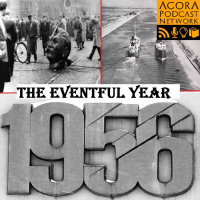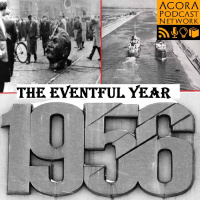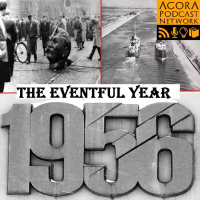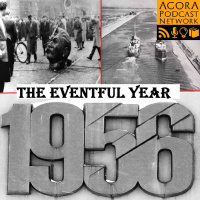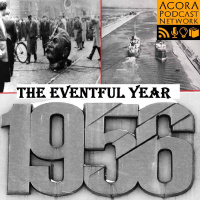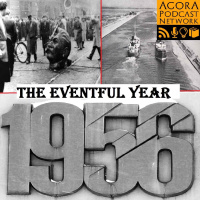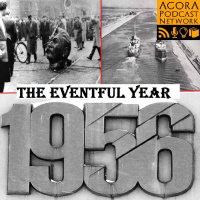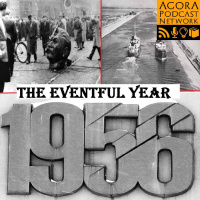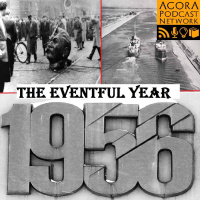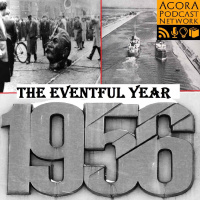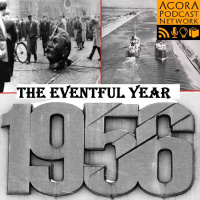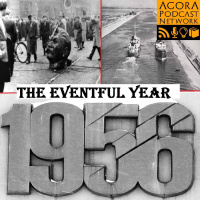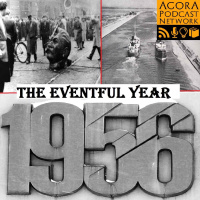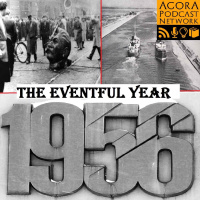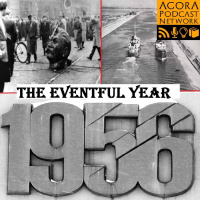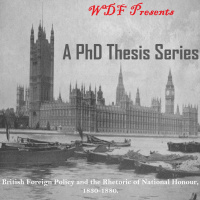Sinopsis
A weekly podcast covering the build up to, breakout of and consequences of various conflicts in history.
Episodios
-
1956 - The Suez Crisis #2.2: Suez, A Life
07/03/2024 Duración: 34minA French investment opportunity, an ancient idea, and a British masterstroke - discover in this episode how the Suez Canal became so monumentally important for British imperial interests in the latter 19th century, and how this interest was then carried over into the 20th century. After years of defending and expanding their stock in Suez, it was highly unlikely that Britain was going to give up its position there without a fight. Yet, at the same time, decolonisation trends across the world were in full swing, and it was far from certain that Egypt could be held while certain movements were underway.The most important of all these movements in decolonisation era Africa was found on 23rd July 1952, when a coup against King Farouk of Egypt, that docile and loyal British puppet, succeeded. A cadre of Egyptian military men now held control over the country, and they were determined to be anything but puppets to the British interest. One figure surged forward above all. His name was Gamal Abdel Nasser, and in thi
-
1956 - The Suez Crisis #2.1: Bitter French Pills
05/03/2024 Duración: 28minIn this episode, we will examine the painful post-war experience of France, why it was so reluctant to let go of its colonies and how this caused it more damage in the long run. As an integral, but largely forgotten player in the Crisis, understanding the French angle is essential for us. On many occasions, the fractured French government would be the only thing holding the also fractured plans for Suez together. Here, we discover what was moving the French in North Africa, and how its bitter Algerian pill, which it would put off swallowing for some time, so influenced its government’s decision to weigh in against Egypt.Remember history friends - you can get these episodes ad-free with scripts attached for just $2 a month - for a fiver you can access our PhD Thesis series, so come and nerd out with us! Hosted on Acast. See acast.com/privacy for more information.
-
1956 Part Two: The Suez Crisis Introduction
05/03/2024 Duración: 19min1956 now enters its second season, and we are confronted with several pressing questions. How did the British, French, Israelis and Americans become involved in Egypt, and how did these events affect what was ongoing in Hungary? The incredible spectacle of these two simultaneous crises, both caused by very different forces, and hosting very different characters, is what we have to examine next, so I hope you'll join me as we introduce the Suez Crisis - perhaps the greatest error of modern Britain until the decision to Brexit! Hosted on Acast. See acast.com/privacy for more information.
-
1956 1.15: Socialism Stays
29/02/2024 Duración: 36min1956 Episode 1.15 examines the final moments of Imre Nagy, as the Soviet noose tightened around him. But the Kremlin was not safe yet. Of particular concern to Moscow and to the Hungarians was the stance of Yugoslavia, as its embassy in Budapest provided asylum to Imre Nagy and 40 other individuals responsible for guiding and leading the momentarily independent Hungarian state. The revolution may have been crushed within a few days, but it was evidently not going to be so simple to remove the memory of Nagy. Although normal Hungarian citizens couldn’t know of his fate, even when he was tricked into leaving this safe haven in late November, behind the scenes the Soviet-Yugoslav diplomacy was only serving to heighten tensions in the communist world.In addition, the Chinese, soon to visit the Eastern satellites in January 1957, had their own comments to make on the events in Hungary. The Chinese conclusion, and the conclusion which has largely survived as canon to this day, was that Vladislav Gomulka had only go
-
1956 1.14: Lessons Learned and Forgotten
27/02/2024 Duración: 36min1956 Episode 1.14 analyses the Soviet response in the first week of November 1956, as the rug was finally pulled on Hungarian independence. Having already removed his country from the Warsaw Pact and requested Western assistance, Nagy was persona non grata in Soviet minds, yet this Hungarian communist was not finished yet. If there was any chance at all that this Hungarian state could be preserved, he was willing to engage in whatever to took to protect his people from the Soviet axe. Yet, unfortunately for Nagy and for Hungary generally, there was no chance. Khrushchev had no intentions of letting Budapest think for itself, and the crushing of the Hungarian revolution and the entry of Janus Kadar into Hungary represented the end note of the Hungarian effort. Kadar, it would transpire, was not the supplicant figure he seemed, but he was ambitious, utterly ruthless and not all constrained by any concept of loyalty to Imre Nagy, a man whom he had known and befriended after several years of close cooperation. Th
-
1956 1.13: Crushing Hope
22/02/2024 Duración: 42min1956 Episode 1.13 examines the unlikely triumph of the Hungarians in Budapest, even as the Soviets schemed for revenge. After somehow wresting a ceasefire agreement from the Soviet Union, the Hungarian revolution appeared – against all odds – to be secured by 28th October. Yet, this was merely a pause for Moscow, it was not the end. As Hungarians began to dream of life outside the Soviet sphere, Soviet tanks were preparing to move, and figures within Imre Nagy’s tightening circle were preparing to stab him in the back. What followed would be bitter, bloody and terribly depressing for those that dreamed big in Hungary, yet for us, it serves to underline the chaotic Soviet experience of the eventful, revolutionary year of 1956. Without giving too much away, this longest episode of 1956 yet brings many issues to their logical conclusion, but we’re far from finished with the story of Budapest, of Hungary or of Imre Nagy just yet, so make sure you stick with us to the somewhat sticky end! Show Less Hosted on
-
1956 1.12: Hope Springs
20/02/2024 Duración: 40min1956 Episode 1.12 examines a key moment when a Hungarian student protest exploded into something far more encouraging, and for the Soviets, far more dangerous. The demands of the protesters – joined by workers, peasants, Hungarian communists, soldiers and many more figures besides – were as disconcerting as the threat the protest posed to Soviet control. Still more incredible than the growth of the protest was the transformation of this protest into a riot, and the further transformation of this riot into a revolution.From these process a rallying cry of hope seemed to spring, as independence and some freedom of action could at last be imagined. Hungarians who had never before dreamed of such things now engaged with all their enthusiasm this most dangerous task – that of standing up to the superpower of the era and their superior in almost every respect. Time would tell if this act would be tragic, or met with miraculous fortune. With far too many individual details to explain here, WDF is so excited to bring
-
1956 1.11: Gone But Nagy Forgotten
15/02/2024 Duración: 36min1956 Episode 1.11 looks at what happened when Moscow decided it’d be a good idea to force Rakosi, the avowed Stalinist, to share power with Imre Nagy, his opposite in almost every respect. Rakosi wished to maintain the status quo even as his favourite weapons like the secret police were taken away, yet Nagy recognised and appreciated from an early stage that much would have to change. Hungary couldn’t continue on in the manner of a repressed, unhappy vassal, especially if Moscow wished to guarantee the support of all Hungarian people. Nagy proposed limited reforms, but after 1953 it began to become apparent that with Stalin gone and Pandora’s Box opened, it was immensely difficult to keep that box closed.Every concession granted to the Hungarians provoked calls for greater concessions – every bit of freedom given permitted Hungarians to become braver and more willing to question the apparatus which held them low. Every time Nagy said yes, the Hungarian people seemed to say more, and Rakosi tattled on him to t
-
1956 1.10: I Did Nagy See That Coming
13/02/2024 Duración: 31min1956 Episode 1.10 continues where we left off last time, and looks a bit more at the person of Matyas Rakosi.Rakosi was the Stalinist dictator of Hungary from the late 1940s, and he set about establishing a Hungarian Stalinist regime, complete with all the trappings Stalin enjoyed. For every purge, every policy and ever character assassination that the man of steel engaged in, Rakosi felt compelled to demonstrate his loyalty by going still further. He would terrorise the people of Hungary into a burning, resentful, petrified silence, but his hold on power was only as strong as the secret police.Imre Nagy, a passionate communist and eager reformer of all things Stalinism, was guaranteed to butt heads with a man like Rakosi, and in this episode we examine why this was the case. What were Nagy’s guiding principles, why was he such a committed communist, and what did he bring to the table that a man like Rakosi did not? Nagy was as complex as Rakosi was cruel, but this doesn’t mean we can’t give our best shot at
-
1956 1.9: Desperately Hungary
08/02/2024 Duración: 32min1956 Episode 1.9 takes a somewhat depressing journey into post-war Hungary, to present a story and a people which suffered much over the course of the Soviet occupation – also known as the Soviet ‘liberation’. Liberation from what, one may ask? Well how about liberation from national pride, freedom of conscience and that all too valuable commodity in history – freedom from fear. Fear was the key ingredient in the Soviet-Hungarian relationship between 1945-56, and in this episode we detail its key characteristics. Why were some Hungarians so eager to serve the Soviets, who were the most loyal Hungarian servants above all, and what were the consequences of this partnership by the time Khrushchev’s secret speech shattered all notions of Stalin-worship?These are questions we get into in great detail here, so I hope you’ll join us. The story of Hungary is as fascinating and inspiring as it is depressing and tragic, but either way, it is a story worth committing to audio podcast format, because it tells us so much
-
1956 1.8: The Star Pupil
06/02/2024 Duración: 28minWe continue our story from last time, as the Polish situation is connected to other fascinating questions. Perhaps the most significant aspect of this chapter in Soviet-Polish relations was the notable involvement of China. The Chinese, it emerged, were very interested in seeing that other peoples travelled their own ‘road to socialism’ as they had done. A Polish road to socialism would validate the unique Chinese experience of struggle over the last few decades, and it would also confirm that Moscow didn’t have the authority to dictate how a communist satellite would feel.Under the Chinese direction and approval, Poland’s limited revolution and Gomulka’s leadership would be safe, but only because, as we’ll see, Gomulka had zero intentions of truly changing any status quos. Unfortunately, Gomulka’s tenure in office was not destined to be a completely wholesome one. His behaviour over the 1960s would confirm that he was far more loyal and far less independently minded than his initial behaviour may have initia
-
1956 1.7: Soviet Sickles
01/02/2024 Duración: 38min1956 Episode 1.7 examines the continuing deterioration of the Polish situation, as Polish citizens dared to ask more and more questions, and to criticise the Soviet order, on their lips was one figure above all – Vladislav Gomulka (pictured). Gomulka was one figure among many who had been disgraced and imprisoned during Stalin’s numerous purges. Gomulka, it was said, was too vocal a critic, and too independent or nationalistically inclined to rule Poland in Moscow’s name. Now though, the Polish people were calling for him, and they were demonstrating on the streets in increasing numbers to do so.Here we detail how the Soviets dealt with this challenge in one of their most sensitive satellites, and what the major concerns of Polish citizens were in light of the revelations of the secret speech. The story involved a face-off between Gomulka and Khrushchev, as the latter made a stormy visit to Warsaw to see for himself in late October exactly what had gone down in Poland. Khrushchev left not with Gomulka’s head,
-
1956 1.6: Polish Hammers
30/01/2024 Duración: 31min1956 Episode 1.6 examines the tumultuous fallout of Khrushchev’s February speech in the context of Poland. What was the Polish experience of living in the Soviet orbit? Here we set the scene and trace a bit of the background. It’s a tragic kind of story if you happen to be a Pole, or care about the sovereignty of independent states, but it also makes for fascinating listening. Here we look at a specific example of a revolutionary study, which tore the lid off of Soviet occupied Poland and which exposed its worst excesses to the world. The release of
-
1956 1.5: Broken Springs
25/01/2024 Duración: 27min1956 Episode 1.5 examines the implications for the Soviet people, as Khrushchev’s speech is disseminated through the sprawling empire. The questions which many citizens had were to be restricted and constrained by the specific parameters set down by the Soviet authorities. In short, as we’ll see in this episode, there was a fine line between debate and dissent. Pravda liked to distinguish between dissent and debate by presenting discussion of the secret speech in the spirit of party-mindedness, rather than a cynical or wholly critical perspective. As always, it was a matter for Khrushchev to determine the difference between debate and dissent, as he attempted to deal with the mess his speech had created.We look at the example of the response given in Moscow’s Thermal Technical University, where three technicians gave their views and planned in grandly ambitious, optimistic ways, only to discover when they returned to work on Monday that their words and phrases had gone too far. Nobody could deny the central t
-
1956 1.4: The People Are Revolting!
23/01/2024 Duración: 32min1956 Episode 1.4 examines the immediate storm caused by Khrushchev’s denunciations of Stalin in late February.Above all, the greatest ingredient in this storm was that of confusion. Soviet officials didn’t know what to tell the assembled crowds, and schoolteachers didn’t know what to tell their pupils. How far exactly could they go in the condemnation of Stalin? This wasn’t made clear, nor was it made clear exactly what Khrushchev hoped to gain. He seemed to vacillate between wanting people to know about the speech and covering up its contents.In Georgia, as we’ll see, the criticism of their favourite Soviet son caused demonstrations and rioting of an anti-Moscow nature, as the impression had been gained that these new Soviet bureaucrats were attempting to tarnish the name of Stalin for their own ends. Putting down these demonstrations were bloody and costly, and their eruption seemed to catch Khrushchev off guard. Indeed, the British and Americans were already learning of the secret speech by the middle of M
-
1956 1.3: A Not So Secret Speech
18/01/2024 Duración: 31minEpisode 1.3 opens with the scene which greeted Khrushchev as he performed that incendiary speech over 24-25th of February 1956. It was a pivotal day in the history of the Soviet Union, and after we unwrap its major aspects, we then tackle the key questions – how had this speech come to be, and how had Khrushchev managed to convince his peers that it was necessary?These questions require answers if we’re to understand and appreciate the world which housed the secret speech, so I hope you’ll tune in here and have a listen to an incredible period of history, when Josef Stalin – the father of peoples and the sun of the universe, was exposed as the monster that he was, by the very people who had followed his lead and helped him craft the system that dominated much of the continent.What followed the secret speech then were other questions – how would Khrushchev et al manage to reconcile their involvement in Stalin’s crimes with this new course, and how would they manage to critique Stalin’s role in creating the Sov
-
1956 1.2: Bolshevik Battle Royale
16/01/2024 Duración: 31minEpisode 1.2 follows on from where our first episode left off. Here, the power struggle between the Soviet Union’s top men is in full swing, and power plays, character assassination, genuine assassination and even more tactics besides distinguish this period of post-Stalin Soviet history. Nikita Khrushchev’s victorious succession and confirmation as First Secretary was far from certain once the struggle began, but as his rivals continued to underestimate him, and as he worked to build up his power base while the big fish sniped at one another, Khrushchev emerged as the best candidate to fill Stalin’s murderous shoes. Yet, it was far from clear at the same time exactly what Khrushchev had in mind.For one, the so-called Thaw had been on-going since Stalin’s death, as prisoners were released, trumped up charges commuted, and some of the more unpopular policies relaxed. Would Khrushchev make efforts to expand upon this approach to Soviet rule, or would he contain its potential dangers as soon as he was able to do
-
1956 1.1: Death of a Comrade
11/01/2024 Duración: 32minWhat happened when the architect of the Cold War passed away? Would the Soviet Union Stalin built adapt to a new successor, or would a set of chain reactions doom the empire in its cradle? If you want to learn more about what followed after the Korean War – as a story and as a year of significance, 1956 has few equals, and we open our narrative with the event which set up all subsequent events – the death of Josef Stalin on 5th March 1953. As far as deaths of prominent characters go, the death of Stalin from a succession of strokes at the age of 73 sticks out particularly – a man who allowed his paranoia get the better of him, out of fear of his own vulnerability and out of lust for power, died without being the victim of any underhanded scheme. As we’ll see, he also died without naming an official successor, throwing into chaos those men who had stuck around long enough to accumulate some power for themselves. In this episode we’ll meet these figures – the so-called ‘collective leadership’ of the Soviet Unio
-
1956: Introduction to Part One
11/01/2024 Duración: 11minWelcome to 1956, an era of schemes, revolution, propaganda, intrigue and a whole lot of diplomacy!Originally brought exclusively to patrons, I've repurposed this series for all listeners, and within it you will learn exactly why I believe this eventful year is well worth your time. Our series begins with the death of Stalin, a megalomaniacal dictator who left no successor save the clique of people who had managed to survive his paranoid wrath for several years. Nikita Khrushchev, against all the odds, managed to surge above the rest. But before he could do this, and before he presented his vision for a post-Stalin world, we must set the scene.This begins our new biweekly release schedule, so I hope you're excited. If you somehow need more of Dr Zack, make sure to sign up on Patreon for our PhD thesis series, and help make history thrive! Hosted on Acast. See acast.com/privacy for more information.
-
PhD Thesis: Introduction Part 1
08/01/2024 Duración: 44minLike what you hear? Consider signing up on Patreon to access the entire series. Thanksss!For the last four+ years, this PhD thesis has been my obsession. Like pushing a boulder up a hill, the struggle was real. But, sometimes, struggle can produce great things, and I hope you'll agree that what I made is worthy of your time. This series comes exclusively to $5 patrons, but as is customary, listeners get the first episode for free. See if you like the sound of this nitty-gritty exploration of history we have planned, and if national honour really is as important as I claim. Maybe you're curious about the kind of kind of work expected for such a high standard of research? Perhaps you just want to know what I've been frantically working at during the last four+ years. Whatever brings you to this chunky series, we have a lot to get through. This is the first step towards unwrapping this 100k-word beast, so I hope you'll join me! Hosted on Acast. See acast.com/privacy for more information.

